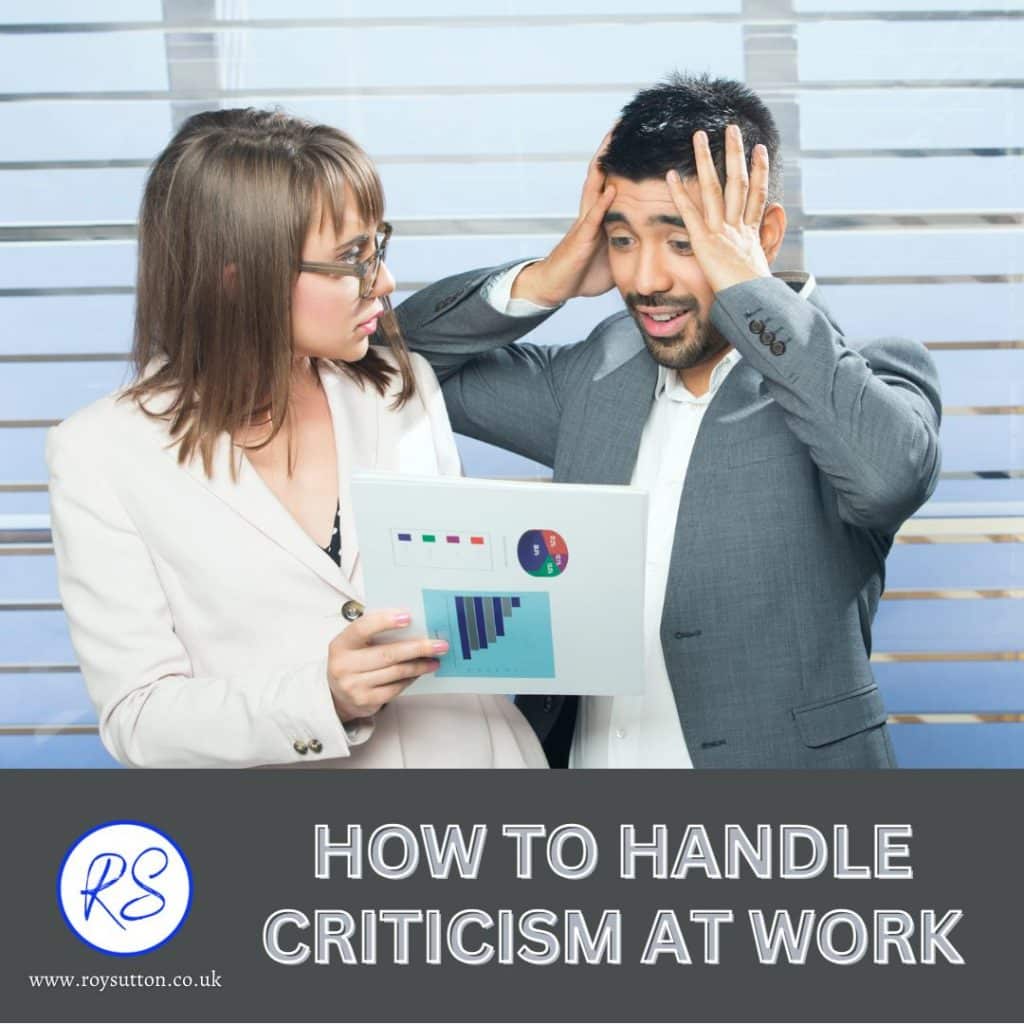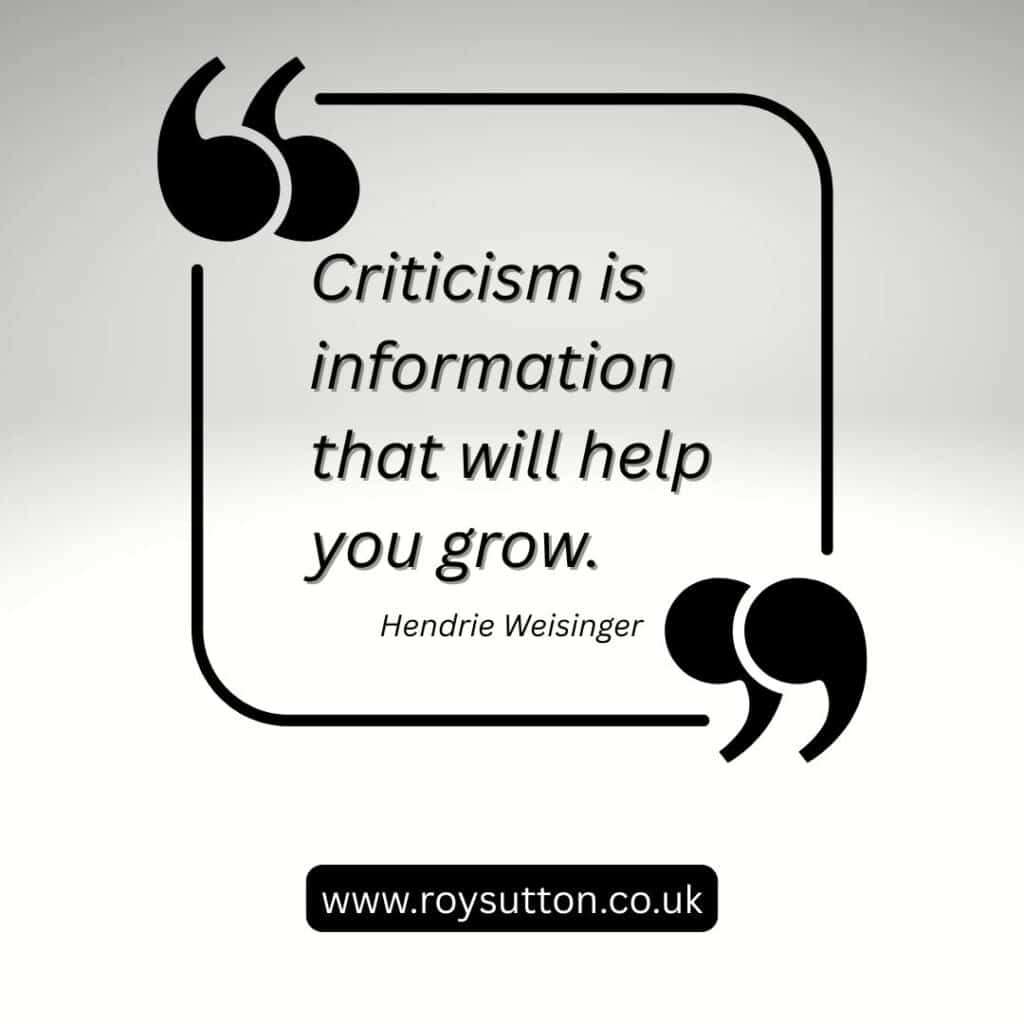
How to handle criticism at work? That’s a question most of us ask ourselves, at least occasionally.
Think about it. You’ve been working hard and trying to do your best, but someone still thinks it’s necessary, with a critical tone, to offer you some words of advice about the work you’ve just done.
Not a thank you; no recognition of the effort you’ve put in; just some caustic words about why they think your work is less than perfect.
Naturally, that makes you feel a little unloved, a bit defensive, and probably slightly irritated too.
Perhaps your critic lacks sensitivity?
Perhaps he or she fails to appreciate the value you’ve been adding to whatever you were doing at the time.
And of course, your critic may not have had visibility of the constraints you were working under or the pressures you faced at the time.
Regardless of the circumstances, it’s natural if you feel hurt when all people can do is point to something they believe is wrong, incomplete, or not as good as it could have been. If it doesn’t hurt, certainly it is irritating, in my experience. It can also seem overly harsh at times.

The importance of criticism:
The problem when hearing criticism is that our defensive barriers tend to go up immediately. And once we’re on the defensive, we don’t tend to listen to the feedback we’re getting. We just concentrate on how we’ll respond in order to dismiss whatever’s being said.
This is unfortunate because if we did listen and reflect on what is being said, it’s just possible that our critic may have a valid point.
The importance of criticism is that it provides us with valuable feedback.
And how we react to any feedback depends on our attitude and how we choose to look at it.
We can get all hurt and defensive, or we can choose to give our critic the benefit of the doubt and assume that they’re genuinely trying to be constructive.
In other words, we can embrace criticism positively and seek to use it to our advantage. Certainly, this is the mature and grown-up way of dealing with any criticism we receive.
Honing our skills:
We must recognize that none of us is perfect and we’re all prone to making the occasional mistake. That’s human nature.
However, if our aim is to succeed, we have to become masters of our chosen craft or profession. We have to be very good at whatever we’ve chosen to do if we’re going to stand out in the crowd. We have to be the best.
Being the best requires the constant honing of our skills. That means we must learn from our mistakes and any inability that might prevent us from delivering the results required of us.
Learning is a lifelong process, and we should be constantly practising and developing our skills and improving on the results we deliver.
To do that, we must learn from our mistakes.
Some mistakes will be obvious to us, of course, but sometimes we’ll fail to recognize them. Fortunately, others don’t.
Criticism is feedback:
The underlying point here is that criticism is simply feedback, and feedback is essential if we’re to improve our skills and become masters of our craft or profession.
That’s why it’s important to listen. If we know where we fall short, then we can do something about it.
How to handle criticism at work:
If you find yourself on the receiving end of criticism, the first thing to do is to remind yourself that feeling hurt is quite natural. That’s simply an emotional response to a negative situation.
However, don’t take anything personally:
Criticism is rarely groundless, though it’s often exaggerated.
Give your critic the benefit of the doubt and assume their intention is simply to provide you with some valuable feedback.
Welcome that feedback. Don’t interrupt your critic with excuses. That will just make you look defensive. Don’t glower at them either because you might stop them from sharing that crucial insight with you.
The truth may hurt, but the sooner you hear it, the sooner you can fix whatever it is you’re doing wrong, assuming you are doing something wrong.
Listen and focus on hearing everything being said.
When your critic has made his or her point, say thank you.
That will show confidence, dedication, and grace too.
Then ask yourself honestly:
Is the point being made by your critic a fair one?
And you do need to be honest with yourself here.
If you conclude that your critic has a fair point, then you must embrace the lesson. Learn from it; resolve to do better next time, and be determined to improve.
That way you’ll go from strength to strength. You’ll gain the respect of other people, too, for your willingness to listen and learn.
If they are wrong:
However, remember this as well:
Critics are not always right.
If honest reflection leads you to the conclusion that your critic is being unfair or is just plain wrong, then just ignore the criticism.
Smile and move on. Never take it personally, and never let anyone discourage you from the pursuit of your aims.
Conclusion:
Criticism is just feedback.
Feedback is your friend.
Embrace it; learn from it; use it to your advantage, but never take it personally.
And if, following honest reflection, you think they’re wrong, then it’s perfectly reasonable to ignore it and move on.

Please share this post:
If you found this article useful, then please share it on social media with your friends.
When you share, everyone wins.
So go on, please share it now. If you can do that for me, I’ll be forever grateful, and you’ll be helping a keen blogger reach a wider audience.
Thank you for your support.
Other articles you might find interesting:
- 3 ways for getting rich
- 5 ways to kill your dreams
- 33 life lessons learned that are best learned early
- How the power of words can change lives
- 10 steps for making new year’s resolutions
- Public Speaking: The Power of the Pause
- Productivity Tips: How to Structure Your Day
- George Carlin’s Top 10 Rules For Success
- 4 cornerstones for how to speak so people will listen
- A Motivational A – Z Guide to Success
- Have the courage to step out of your comfort zone
- 3 of life’s lessons learned that you really should know
- Valuing people must take precedence in the modern age
- Top wealth creation strategies for financial success
- Why an investment in knowledge pays dividends
- 13 tips for improving your personal happiness
- Steve Jobs’ Top 10 Rules For Success to inspire you
- 25 inspirational stories of people going from rags to riches
- How to find the right job for you: Simply Explained
- How to spot a liar and be your own lie detector
- Self-promotion and why it matters if you want success
- 21 things you need to know in life to avoid its pitfalls
- 9 tips for getting the most from your work
© Mann Island Media Limited 2025. All rights reserved.


